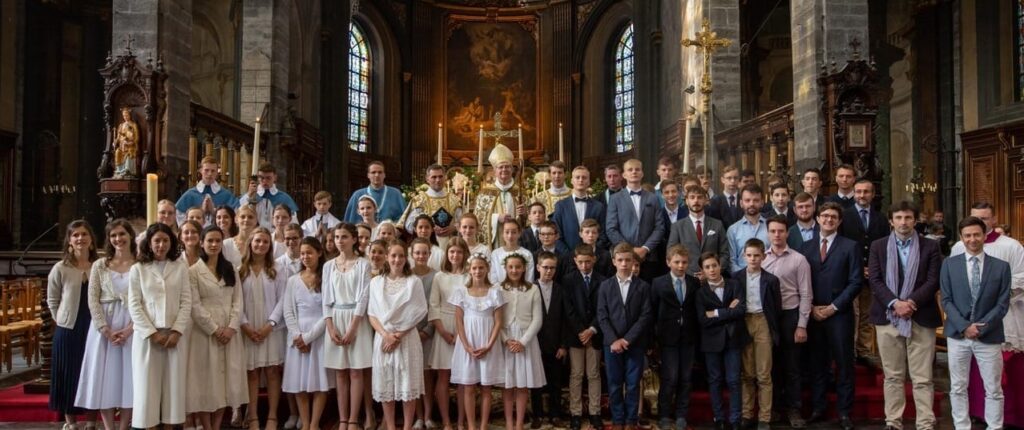Archbishop Ulrich of Lille administered Confirmation in the Immemorial Rite last Saturday in his archdiocese
(Paris) The appointed new archbishop of Paris administered Confirmation in the Immemorial Rite of All Ages in his previous diocese. The change to the Bishop's Chair on the Seine could be a stroke of luck.
Monsignor Laurent Bernard Marie Ulrich, originally from Burgundy, was appointed the new Archbishop of Paris by Pope Francis on April 26. The inauguration will take place next Monday.
Last Saturday, May 14, he administered the Sacrament of Confirmation to a group of 55 faithful in Lille, his previous diocese. A real boost in the atmosphere of Traditionis Custodes.
On May 23, Msgr. Ulrich will succeed Archbishop Michel Aupetit, who retired on December 2, 2021 at his own request by Pope Francis. Aupetit may have fallen victim to an orchestrated intrigue, but his retirement seems to have unexpectedly turned out to be a stroke of luck.
Laurent Ulrich was born in 1951 in Dijon, Burgundy. He studied at the Universities of Burgundy and Lyon and was ordained a priest for his home diocese in 1979. He worked in parish pastoral care, from 1985 also as Bishop's Vicar and from 1990 as Vicar General. In 2000, Pope John Paul II appointed him Archbishop of Chambéry in Savoy. Pope Benedict XVI then promoted him to Archbishop of Lille in French Flanders, the Dutch-speaking part of France, in 2008. As such, offered confirmation in the traditional Rite a few days ago in his cathedral.
Archbishop Ulrich's decision to personally confirm the faithful in the traditional Rite contrasts surprisingly well with the repressive climate created by Pope Francis with the motu proprio Traditionis Custodes on July 16, 2021 and tightened by the Congregation for Divine Worship with its answers to Dubia on Traditionis Custodes.
These tightenings have it all. The new Prefect of the Congregation for Divine Worship, Archbishop Arthur Roche, announced on December 4, 2021 in the answers to the Dubia that only the Sacrifice of the Mass may be celebrated in the traditional form, while all other sacraments are to be administered in the Bugnine Liturgy of Paul VI. However, Archbishop Lille ignored this Roman repression and offered – perhaps for that very reason, personally – 55 faithful in the church of Saint-Étienne in Lille to be confirmed in the traditional Rite. He was assisted by priests of the traditional institute Christ the King and Sovereign Priest.
It is unlikely that this would endear the new Archbishop of Paris to Santa Marta, where any movement of the traditional liturgy that occurs outside of narrow confines is viewed with great suspicion. However, his appointment has already been made and his inauguration is imminent. In any case, Pope Francis no longer links cardinalatial dignity to specific bishoprics. The last Archbishop of Paris to receive purple was André Vingt-Trois, who was then admitted by Pope Benedict XVI to the College of Cardinals.
Even bishops, who have a reputation for being very close to Pope Francis, fall from grace when they show a gesture of benevolence to the traditional Rite. An example of this is Cardinal Matteo Zuppi, Archbishop of Bologna and senior cleric in the ranks of the Community of Sant'Egidio. He implemented the Motu proprio Traditionis Custodes in his Archdiocese to the letter, not being more generous than the Pope would allow, but using all the possibilities contained therein for the benefit of the traditional Rite. Until then, Cardinal Zuppi was considered a possible crown prince by Pope Francis, which changed abruptly. In Santa Martha, Zuppi's concessions to traditional circles were interpreted as a "gambit" to make himself popular in a future conclave.
What Pope Francis wanted was demonstrated by his protégé and ghostwriter, Archbishop Victor Manuel Fernández, Archbishop of La Plata and perhaps soon Archbishop of Buenos Aires and Cardinal. Msgr. Fernández eliminated the Motu Proprio Summorum Pontificum in the Archdiocese of La Plata at Christmas 2018. In doing so, he anticipated by two and a half years what Pope Francis was to achieve with his Motu proprio Traditionis Custodes.
It will be seen how the relationship between Monsignor Ulrich and Santa Marta will develop. First of all, it is to be hoped that the new archbishop of Paris will take his benevolent attitude towards the traditional Rite with him to the Seine, where his predecessor Aupetit imposed restrictions, and exert an influence on the French episcopacy as a whole.

Text: Giuseppe Nardi
Image : Facebook/ICRSS (Screenshots)
Trans: Tancred vekron99@hotmail.com
AMDG




